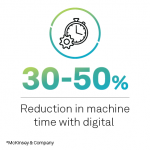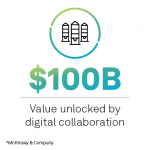The manufacturing industry is in a constant state of change, with manufacturers facing numerous challenges and trends that are shaping the way they operate. As a company that works closely with customers in manufacturing — and as manufacturers ourselves —we have a deep understanding of these industry dynamics.
Examining these trends and challenges from a macro perspective reveals four primary categories: enhancing productivity through digitalisation, managing costs for increased profitability, promoting sustainability and dismantling silos.
 Increasing productivity
Increasing productivity
Businesses frequently face challenges in fully utilizing the available data. As a result, automation has become increasingly crucial for companies seeking to enhance productivity. By embracing digitalisation initiatives that strengthen the connectivity of digital data, manufacturers can significantly boost productivity. In fact, McKinsey reports that digital transformation may lead to a 15-30% increase in labour productivity and a 30-50% reduction in downtime for manufacturers.
 Managing costs to drive profitability
Managing costs to drive profitability
In late 2021, the BCIS Materials Cost Index reported that global material costs had reached a 40-year high, underscoring the growing importance for manufacturers to effectively manage costs to remain successful. To combat these escalating costs of raw materials and labour, it is essential for manufacturers to ensure their end-to-end processes are interconnected and optimised. By implementing closed-loop workflows across departments and promoting agility, seamless data exchange can be achieved — enabling manufacturing companies to streamline operations and boost profitability in the face of rising expenses.
Fostering sustainability
Sustainability is more critical than ever before. Beyond environmental impacts, businesses must consider economic sustainability, resource production and consumption, social responsibility and other factors to remain competitive in an evolving market. Connected systems empower manufacturers to think about sustainability holistically, providing tools and insights to make informed decisions and reduce negative impacts.
 Breaking down silos
Breaking down silos
Manufacturing ecosystems consist of diverse facilities, such as OEMs and suppliers, with teams collaborating remotely on product development. Both internal and external silos can hinder progress, making digitalisation essential for breaking down these barriers. McKinsey estimates that digital collaboration could unlock over $100 billion in value for the industry — meaning manufacturers must adopt digitally connected solutions to promote collaboration and interaction across departments.
Introducing a new era of digital reality for manufacturing
In response to evolving industry trends and challenges, manufacturers must seek out solutions that link people, technologies and data to expedite innovation and bring ideas to fruition faster than ever before.
Nexus is our answer to manufacturing’s long-standing challenges.
This open digital reality platform integrates technologies from Hexagon and our partners to facilitate secure connectivity and data sharing amongst teams. Nexus supports cloud-based, task-oriented native applications and collaborative workflows, simplifying process optimisation and information access for end users. Additionally, it provides a personalised, interactive method for users to access products, apps, solutions, training, documentation and support information in one location.
Connected and open digital platforms are essential in addressing the dynamic needs of the manufacturing industry. By confronting critical challenges and trends — such as improving productivity, managing costs, promoting sustainability and breaking down silos — Nexus enables companies to drive innovation and meet the demands of a constantly changing world.
[Related: Learn more about Nexus and how it’s empowering manufacturers from our recent virtual launch]


















